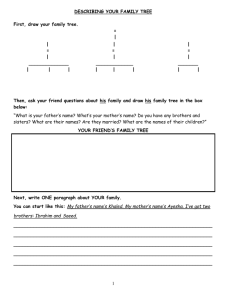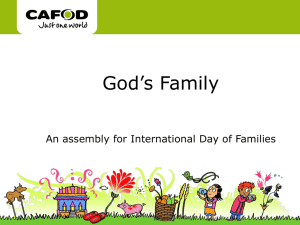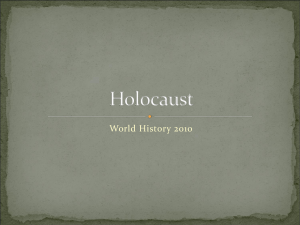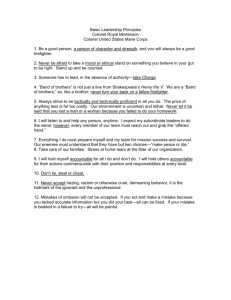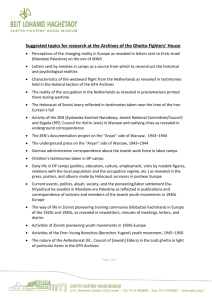Children - Holocaust Readings - March of Remembrance and Hope
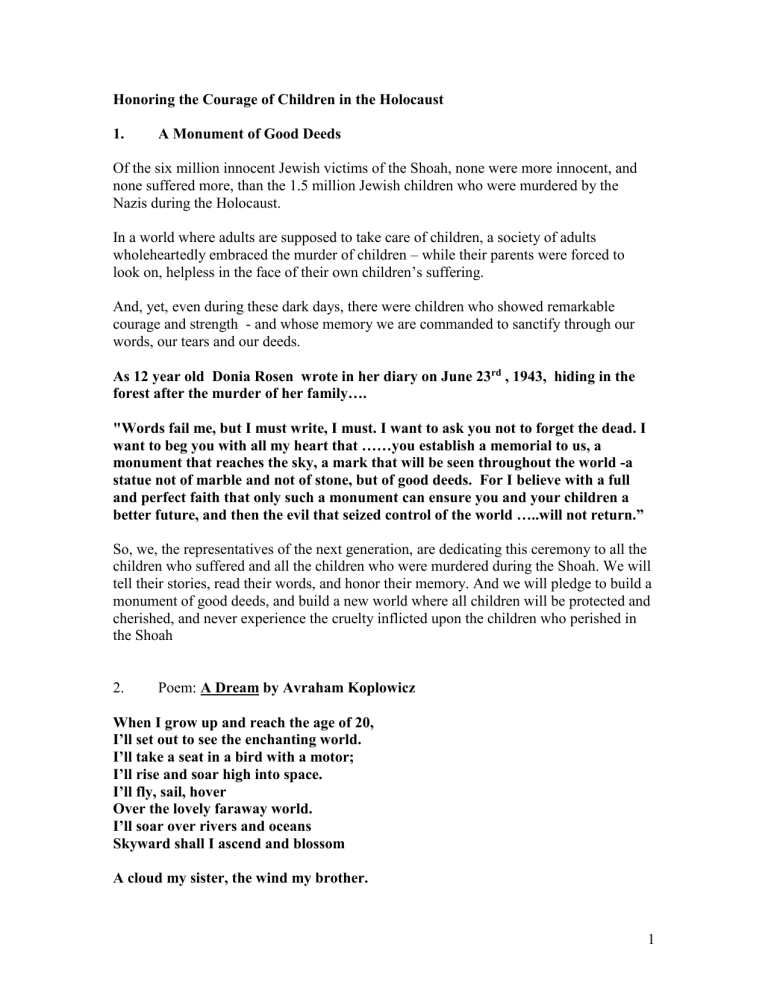
Honoring the Courage of Children in the Holocaust
1. A Monument of Good Deeds
Of the six million innocent Jewish victims of the Shoah, none were more innocent, and none suffered more, than the 1.5 million Jewish children who were murdered by the
Nazis during the Holocaust.
In a world where adults are supposed to take care of children, a society of adults wholeheartedly embraced the murder of children – while their parents were forced to look on, helpless in the face of their own children’s suffering.
And, yet, even during these dark days, there were children who showed remarkable courage and strength - and whose memory we are commanded to sanctify through our words, our tears and our deeds.
As 12 year old Donia Rosen wrote in her diary on June 23 rd forest after the murder of her family….
, 1943, hiding in the
"Words fail me, but I must write, I must. I want to ask you not to forget the dead. I want to beg you with all my heart that ……you establish a memorial to us, a monument that reaches the sky, a mark that will be seen throughout the world -a statue not of marble and not of stone, but of good deeds. For I believe with a full and perfect faith that only such a monument can ensure you and your children a better future, and then the evil that seized control of the world …..will not return.”
So, we, the representatives of the next generation, are dedicating this ceremony to all the children who suffered and all the children who were murdered during the Shoah. We will tell their stories, read their words, and honor their memory. And we will pledge to build a monument of good deeds, and build a new world where all children will be protected and cherished, and never experience the cruelty inflicted upon the children who perished in the Shoah
2. Poem: A Dream by Avraham Koplowicz
When I grow up and reach the age of 20,
I’ll set out to see the enchanting world.
I’ll take a seat in a bird with a motor;
I’ll rise and soar high into space.
I’ll fly, sail, hover
Over the lovely faraway world.
I’ll soar over rivers and oceans
Skyward shall I ascend and blossom
A cloud my sister, the wind my brother.
1
I’ll marvel at the Euphrates and the Nile,
I’ll see the Pyramids and the Sphinx
Of ancient Egypt, where the goddess Isis reigned.
I’ll fly over Niagara Falls
And immerse myself in a searing Sahara dune.
I’ll drift over the cloud-strew cliffs of Tibet
And the mysterious land of the wizards;
And once I extricate myself
From the scorching, terrifying wave of heat,
I’ll meander over the icebergs of the north.
By wind I’ll cross the great kangaroo island
And the ruins of Pompeii,
And the Holy Land of the Old Testament,
And over the land of the renowned Homer
I’ll fly slowly, slowly, hovering lazily.
And thus, basking in the enchantments of this world,
Skyward shall I soar and blossom
A cloud my sister, the wind my brother.
Written by Avraham Kopolowicz who was sent to Auschwitz on the last transport that left the Lodz ghetto. He was murdered in Auschwitz in September 1944.
3. The Child Who Ran in Circles
The story is told of a young boy who was seen in the transit camp of Westerbork running in circles for hours yelling, shouting, and screaming at the top of his lungs.
He had arrived in the camp that morning after being discovered in a hiding place with a gentile family where he had been concealed for a year.
When he arrived in the camp, he barely spoke, and if he did, it was with the faintest whisper. When he walked, he moved ever so slowly, placing one foot down on the ground, as softly and as quietly as possible.
You see, to avoid detection the boy had been instructed when he was in hiding not to speak or move unless it was absolutely necessary – and even then he was to speak and move as little and as quietly as possible.
When he arrived in the camp, he still acted as though he were in hiding. Until someone told him, that in Westerbork, one was allowed to walk around and talk to others with relative freedom.
2
And that was when the boy began to run in circles, and yell and shout for hours….
But his new found freedom was short-lived. A short time later he was deported to
Auschwitz where he perished.
Narrator: We pray for a world where no child will be forbidden from running and playing, from speaking and singing – where no child will be stopped from being a child….
We pray for a world where children will suffer war no more, and where every hand that holds a sword, will instead caress a child….
4. Narrator: Over the past few decades, thousands of young students have been traveling to Poland to honor the memory of those who perished during the Holocaust.
When they return, they express their feelings about their journey, through poetry, prose and art. Much of their creative work concerns the experience of children during the
Holocaust – who were not much different than those of us gathered here. They were all children just like you and me.
Just Like Me
Those victims of man's hatred were children just like me
Those who once had normal lives were children just like me
Those uprooted from their lives
Those dragged from their homes in the middle of the night were children just like me
Those robbed of everything they had were children just like me
Those locked behind a ghetto wall. were children just like me
Those struck by pain and poverty were children just like me
Those taken by starvation and disease were children just like me
Those forced to brave the endless winters were children just like me
Those who never saw the outside world were children just like me
Those left orphaned in the streets were children just like me
Those robbed of their childhood were children just like me
Those robbed of their smiles were children just like me
3
Those who never even had a chance were children just like me
Those ripped from the arms of their mothers were children just like me
Those shipped in from far off lands were children just like me
Those forced to stand for days on end were children just like me
Those killed before their time were children just like me
Those marched unwillingly to their deaths were children just like me
Those stripped and shot and gassed and burnt were children just like me
Those buried I pits, in unmarked graves were children just like me
Those all too young to die were children just like me
Those flickering lights in a cold dark world were children just like me
Those silent soldiers who fought off the darkness were children just like me
Those one and a half million innocent souls were children just like me
Yes, those children of the Holocaust were children just like me
And you, who killed my neighbours, my friends and my family
You too, were children just like me
5. “Don’t Say Mama”
The place where it was witnessed was the town of Stolpce. The time was September
1942, during the liquidation of the ghetto. A mother had brought her three children into a room of a house, hoping to hide there. She hid them some ways off from her, hoping that if she was found and taken out, her children would not be seen and would survive. In fact, when the search began, it was her children who were found and not her. The mother's hiding place was not discovered.
As her three children we being dragged away, the youngest one cried out: "Mama,
Mama". But his brother - he was about 4 years old - silenced him with the words: "Zog nit mameh, men vet ir oich zunemen.." Don't say Mama, they'll take her too."
Source: Martin Gilbert Lecture
4
6. Tomorrow On
From tomorrow on,
I shall be sad--
From tomorrow on!
Today I shall be glad
What is the use of sadness--tell me that?—
Because these evil winds begin to blow?
Why should I grieve for tomorrow--today?
Tomorrow may be so good, so sunny,
Tomorrow the sun may shine for us again; We shall no longer need to be sad.
From tomorrow on, I shall be sad-- From tomorrow on!
Not today; no! today I will be glad. And every day, no matter how bitter it be, I will say: From tomorrow on, I shall be sad, Not today! written by Motele in Terezin
Source: From Out of the Whirlwind by Albert H. Friedlander Schocken
7. "They were Heroes Too" by Zbigniew Mankowski
________________________________
As a teenager during the Second World War I lived with my parents and two elder brothers in one of the then suburbs of Warsaw called Fort Mokotow, which was then filled with Luftwaffe officers billeted in neighbouring
Polish houses. Our villa stood in a pretty garden, full of greenery and flowers, surrounded by a fence. In front of the house there were fields and gardens, in which we, and others, planted potatoes and various kinds of vegetables to survive. An almost idyllic scene one would say. However, all around us was raging one of the cruelest wars in history.
For several months the bell used to ring at our front door. First seldom, then more and more often. But looking out of the window we did not see
5
anybody at the gate. Only some invisible hands put on the low fence wall two empty cans, with a length of string fastened to them serving as handles. But in those days it was easy for us to guess what it meant. They were placed there by starving Jews in the hopes they would be filled up with food by some kind souls.
Whatever extra food we had we shared with a Jewish woman who was concealed for two and a half years in our home and obviously had no ration cards.Still, my mother poured some soup into one of the cans and she filled the other one with rich brown bread and potatoes even thougth the bread was rationed and we were very, very short of it all the time during the war.
Replacing the filled tins on the same place on the fence, I first had to look carefully around to make sure no German was watching me. However, we very well knew that from the nearby potato field two anxious pairs of eyes were watching my every movement. Those eyes, serious, alert, frightened yet courageous, belonged to children no more than 6 and 8 years old. Every daythey left the bleak and desolate Gesia, Nalewki, Mila, and many other streets of the ghetto, and then, stealing through some breach in the wall which separated them from the world of the living, they crept along the still sunny and seemingly peaceful district of our Mokotow - their daily
Golgotha.
Dressed in rags, some oversize coats, much too big for their size and age, with large pockets, barefooted to be able to move noiselessly, crouching almost to the ground, they leaped out of their shelter in the thicket and ina flash snatched the tins and vanished out of sight.
Discreetly observing them through the curtains I noticed that they did not eat what they received; it was meant for others more hungry than them.
Despite their tender age they seemed no longer to be mere children, they were mature beyond years, aware of what they were doing. They were very careful as they realized that their presence could bring danger and disasterto our whole family. They did not or could not think of what lay in store for them.
This lasted a few months - not every day - but every few days the boys would come. We had almost become friends, even though we hadn't exchanged a word.
One day they stopped coming...
Some time later the wind from the northern part of Warsaw brought to our garden with smoke, pieces of partly burnt paper. I noticed on them traces of some strange, at that time unknown to me, letters and signs. Those were Jewish letters, Jewish characters.
6
The Warsaw Ghetto was on fire. I never saw my two Jewish friends again.
All this took place during the festive days of Osterfest, Passover,
Easter of 1943 - holidays that should have brought joy and peace to people of all nations...
[Then Zbigniew Mankowski raised a medal and, holding the medal near his heart, told the students, "Years later I received this medal from Yad
Vashem, the most beautiful medal one can imagine. You see, most people receive medals for taking lives, but this medal was given for saving lives.
I have received many awards in my life, but this one is the most precious to me.]
When, after nearly 50 years, I had the honour of receiving the distinction of "Righteous Among the Nations", I shared in my mind a part of that honour withthose anonymous Jewish boys, heroes of those years who will for ever remain engraved in my memory.
They tried to save people too.
[Based on a letter written by Zbigniew Mankowski and a personal address he gave to Canadian Jewish students visting Poland in 1999. A version of this story was read by Wojtek Ziemilski, during the 2000 March of the
Living ceremony in Birkenau.]
8. Where Have You Gone?
Where are you little Moshe?
Where have you gone?
The last I was told, you were alone and afraid taken from your mother's arms - only nine years old
The sound of her voice calling your name consumes your ears as they forced her into the distance - forever.
Where are you little Moshe?
Where have you gone?
I've come back here to save you, to ease your pain
But all I've found are barren fields echoing - empty silences
Is it possible that you were taken too, and that no one answered your cries?
7
Where are you little Moshe?
Where have you gone?
Is it true that no one heard you?
That the ears of mankind became deafened even to the cries of a child
Was there anyone there, to sing you a lullaby Moshe, when you were afraid?
I am here now
Where are you little Moshe?
Of course, now I see you
Walking in the light
Your father, Abraham, holding your hand
Surely you walk before the Almighty One -
You who kept the covenent, and died for being a Jew
Surely you walk before Him
For your sins were none, and you tears He counted.
Joanna Raby 17
Montreal, Quebec
9. Ballad of the Seven
A wanderer, lost in a dense forest on a stormy night sees at a distance a light dimly shining out of a lonely hut
He knocks on the door enters and sees a young boy age nine, sitting at a fireplace
— Greetings, my child
— Greetings, stranger, replies the boy.
— Are you alone here?
And there the dialogue between the two begins:
— No sir, we are seven:
Father, mother, two brothers, two sisters and myself
— Where is mother?
— Mother died.
— Oh, then you are only six my child.
— No, sir, we are seven:
8
Father, mother, two brothers, two sisters and myself
— Where is father?
— Father was killed in the war.
— Oh, then you are five only?
No, sir! I told you, we are seven: father, mother, two brothers, two sisters and myself.
And your brothers where are they?
— One died in an accident, the other one was taken prisoner and never returned
— Then you are three, only three
— No sir, we are seven:
Father, mother, two brothers, two sisters and myself
— Your sisters, where are they poor child?
— One drowned in the lake the younger one, coming to her rescue drowned too and perished in the water
— Then you are one only, my boy, alone - aren’t you?
— No sir, we are seven in this hut:
Father, mother, two brothers, two sisters and myself
How can a man, like myself and all other fellow survivors and our friends and people of good will everywhere grown in years and mature preserve that thing which the young boy kept to himself; and expressed in his own childish way
Perhaps, it is this memory that gives us the right to love and to go on...
As long as there are somewhere such huts in the world, such hearts that beat with remembrance we can turn to field and sky, to beauty and joy and say that our dear ones are here, living among us not as shadows, but as an essence of our lives
9
as told by Abba Kovner, commander of the Vilna Ghetto Partisans
10
